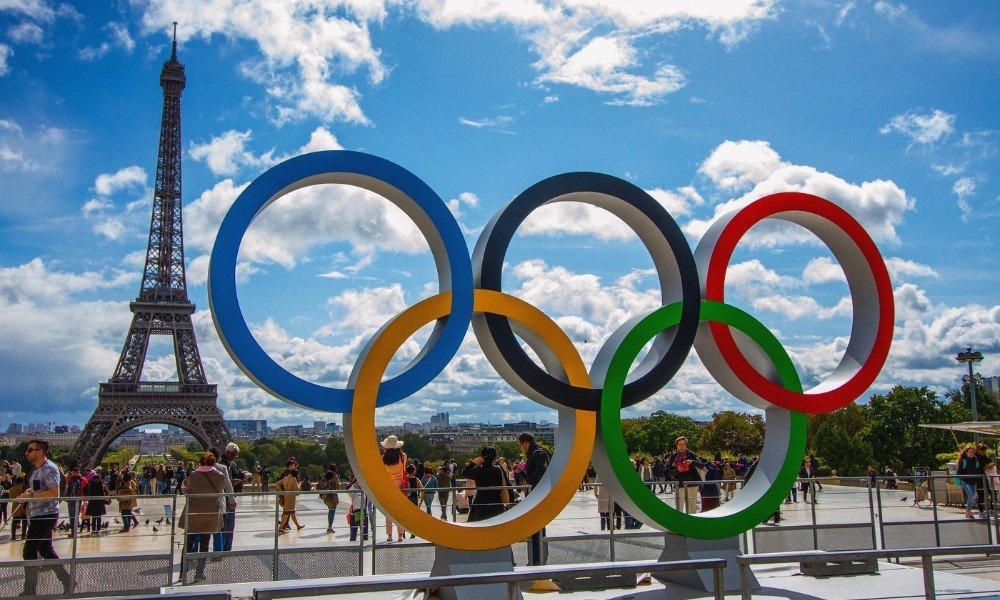-
Table of Contents
- The Future of the Games: Paris 2024’s Lasting Impact
- Accessibility and Inclusivity: Breaking Down Barriers in Sport
- The Economic Impact: Paris 2024’s Boost to Tourism and Development
- A Global Stage for Sport: Previewing the Most Anticipated Events
- Engaging the City: Community Involvement and Cultural Celebrations
- Empowering Athletes: The Pursuit of Excellence
- The Games Return to Their Roots: Celebrating Olympic History
- Sustainability at the Forefront: Paris 2024’s Green Initiatives
- A Legacy of Innovation: Venues and Infrastructure
- Parisian Charm Meets Olympic Spirit
The Future of the Games: Paris 2024’s Lasting Impact
The 2024 Paris Olympics are poised to be more than just a global sporting spectacle; they represent a pivotal moment in the evolution of the Games themselves. Paris 2024 aspires to leave a legacy that extends far beyond the closing ceremony, ushering in a new era of Olympic excellence and sustainability.
One of the most significant contributions Paris 2024 offers is its commitment to environmental responsibility. The Games are deeply rooted in sustainability principles, aiming to be the first carbon-neutral Olympics. This ambition is evident in their choice of venues, with a strong emphasis on utilizing existing and temporary structures. Furthermore, the use of renewable energy sources and the implementation of innovative waste management solutions underscore their dedication to minimizing the environmental impact.
Beyond environmental consciousness, Paris 2024 seeks to redefine the social impact of the Olympic Games. Central to this vision is the Games’ commitment to inclusivity and accessibility. The organizers have prioritized making the Games accessible to all, regardless of disability, by ensuring barrier-free infrastructure and services. Moreover, Paris 2024 aims to inspire future generations by promoting gender equality in sports and showcasing Paralympic athletes on an unprecedented scale.
The economic legacy of Paris 2024 is also carefully considered. The Games are expected to act as a catalyst for urban regeneration, particularly in areas like Seine-Saint-Denis, which will host the Olympic Village. This transformation will not only provide improved infrastructure and facilities but also create job opportunities and stimulate economic growth in the region. Furthermore, the Games offer a unique platform to showcase French innovation and expertise on a global stage, potentially attracting investment and boosting various sectors of the economy.
However, the true measure of Paris 2024’s success lies not just in the tangible outcomes but also in the intangible legacy it leaves behind. The Games have the power to inspire a new generation of athletes, promote the values of sportsmanship and fair play, and foster a sense of global unity. By showcasing the transformative power of sport, Paris 2024 can leave an indelible mark on the hearts and minds of people around the world.
In conclusion, Paris 2024 represents a pivotal moment in the history of the Olympic Games. By embracing sustainability, inclusivity, and innovation, Paris 2024 has the potential to redefine what it means to host the Olympics. The Games offer a glimpse into a future where sporting excellence goes hand in hand with social responsibility and environmental consciousness, leaving a lasting legacy that extends far beyond the realm of sport.
Accessibility and Inclusivity: Breaking Down Barriers in Sport
The Paris 2024 Olympic and Paralympic Games have set their sights on a noble ambition: to host the most accessible and inclusive Games in history. This commitment goes beyond simply meeting accessibility standards; it represents a fundamental shift in perspective, aiming to break down barriers and create an environment where everyone, regardless of their abilities, can fully experience the transformative power of sport.
Central to this vision is the concept of “universal accessibility.” Paris 2024 aims to ensure that all venues, infrastructure, and services are designed and implemented with the needs of all individuals in mind, including those with disabilities, seniors, and families with young children. This means incorporating features like ramps, accessible toilets, audio descriptions, and sign language interpretation throughout the Games’ infrastructure.
Furthermore, Paris 2024 is placing a strong emphasis on inclusivity in athlete participation. The Games will witness the largest Paralympic program ever, with more athletes and medal events than any previous edition. This expansion reflects a dedication to showcasing the exceptional talents of athletes with disabilities and inspiring future generations.
Beyond the physical realm, Paris 2024 is committed to fostering a welcoming and inclusive atmosphere for all. This includes promoting accessibility in ticketing and accommodation, ensuring clear and concise communication across all platforms, and providing comprehensive training programs for staff and volunteers on disability awareness and etiquette.
The impact of these initiatives extends far beyond the two weeks of the Games themselves. By embedding accessibility and inclusivity into the very fabric of the event, Paris 2024 aims to create a lasting legacy that will transform perceptions and inspire positive change across society. The Games have the potential to challenge stereotypes, promote understanding, and demonstrate that sport can be a powerful tool for inclusion and social progress.
In conclusion, Paris 2024’s commitment to accessibility and inclusivity represents a watershed moment in the history of the Olympic and Paralympic movement. By embracing the principles of universal design and fostering a welcoming environment for all, Paris 2024 is poised to deliver a truly transformative Games that will leave a lasting legacy of positive change, not only in the world of sport but in society as a whole.
The Economic Impact: Paris 2024’s Boost to Tourism and Development
Paris, the City of Lights, is poised to illuminate the world stage once again as it hosts the 2024 Summer Olympics. Beyond the thrill of athletic competition, the Games are anticipated to usher in a new era of economic prosperity for the French capital and beyond. The influx of athletes, officials, media, and spectators from across the globe is expected to generate a substantial economic boost, particularly in the tourism and development sectors.
The tourism industry, a cornerstone of the Parisian economy, is gearing up for an unprecedented surge in activity. Hotels, restaurants, museums, and iconic landmarks are bracing themselves for an influx of visitors eager to experience the magic of the Games firsthand. This surge in tourism is projected to inject billions of euros into the local economy, creating jobs and supporting businesses of all sizes. Furthermore, the global exposure provided by the Olympics will have a lasting legacy, attracting tourists to Paris for years to come.
Beyond the immediate impact on tourism, the Paris 2024 Olympics are also serving as a catalyst for urban development and infrastructure improvements. The construction of state-of-the-art sports facilities, athlete villages, and transportation networks is not only enhancing the city’s infrastructure but also creating employment opportunities and stimulating economic growth. These investments will benefit Parisians and visitors alike long after the Olympic flame has been extinguished.
Moreover, the Games are fostering innovation and technological advancements. Paris 2024 has committed to hosting the most sustainable Olympics in history, leveraging cutting-edge technologies to minimize the environmental impact. From energy-efficient buildings to sustainable transportation solutions, the Games are serving as a testing ground for innovative approaches that can be replicated in cities around the world.
In conclusion, the Paris 2024 Olympics represent far more than just a sporting event. They are a catalyst for economic growth, urban development, and technological innovation. The Games are expected to leave a lasting legacy on the city of Paris, boosting tourism, creating jobs, and enhancing the quality of life for its residents. As the world turns its attention to Paris in 2024, the city stands ready to embrace the economic opportunities and showcase its commitment to a more sustainable future.
A Global Stage for Sport: Previewing the Most Anticipated Events
Paris 2024 is poised to be more than just another Olympic Games; it’s shaping up to be a groundbreaking celebration of athleticism, innovation, and global unity. As the world eagerly awaits this sporting spectacle, anticipation mounts for the events that will captivate audiences and etch their names in Olympic history.
One of the most highly anticipated events is the return of Rugby Sevens to the Olympic stage. Following its electrifying debut in Rio 2016, Rugby Sevens has continued to grow in popularity, captivating fans with its fast-paced action and unpredictable gameplay. The Stade de France, an iconic venue steeped in sporting history, will provide a fitting backdrop for this thrilling competition.
In a similar vein, the world will be watching as athletes take to the water for the debut of kiteboarding at the Olympic Games. This high-octane sport, known for its impressive aerial maneuvers and technical skill, is sure to be a visual spectacle. Marseille, with its ideal wind and water conditions, will serve as the perfect host city for this exciting addition to the Olympic program.
Beyond these new additions, Paris 2024 will also feature classic events that always deliver unforgettable moments. The athletics competition, held in the newly renovated Stade de France, promises to be a highlight, with the world’s fastest runners, jumpers, and throwers vying for glory. Similarly, the swimming events, taking place in a brand new aquatics center, will showcase the incredible speed, endurance, and precision of these elite athletes.
However, Paris 2024 is not just about sporting achievements; it’s also about pushing the boundaries of sustainability and leaving a positive legacy for future generations. The Games will be organized with a strong focus on minimizing environmental impact, utilizing existing infrastructure and renewable energy sources. Furthermore, Paris 2024 aims to be the most inclusive Games yet, promoting accessibility and participation for athletes and spectators alike.
In conclusion, Paris 2024 is shaping up to be a truly exceptional Olympic Games. From the thrill of new sports like kiteboarding to the timeless appeal of athletics and swimming, the competition promises to be fierce and unforgettable. Moreover, the Games’ commitment to sustainability and inclusivity sets a new standard for future sporting events, ensuring that Paris 2024 leaves a lasting legacy that extends far beyond the field of play.
Engaging the City: Community Involvement and Cultural Celebrations

Paris 2024 aspires to be more than just an Olympic Games; it aims to be a celebration of sport, culture, and shared human experience, deeply woven into the fabric of the city itself. Central to this vision is the engagement of Parisians and the broader French community, transforming the event into a shared journey of pride and participation. This commitment manifests in numerous ways, beginning with the Games’ physical footprint. Rather than constructing opulent new venues, Paris 2024 will utilize existing infrastructure and iconic landmarks, seamlessly integrating the Games into the city’s daily life. Imagine beach volleyball beneath the Eiffel Tower or equestrian events against the backdrop of the Palace of Versailles – these stunning juxtapositions will not only captivate a global audience but also allow Parisians to experience their city anew, imbued with the spirit of athleticism and international camaraderie.
Furthermore, the Games will extend far beyond the confines of stadiums and arenas, spilling into the streets and public spaces of Paris. The “Olympic Celebration Sites” initiative will transform iconic locations like the Grand Parc du Champ-de-Mars and the Place de la Concorde into vibrant hubs of activity, offering free concerts, cultural performances, and sports initiation programs. This initiative ensures that the Olympic spirit becomes accessible to all, regardless of their interest in sport or their ability to secure tickets to the events themselves. Moreover, it fosters a sense of ownership and shared celebration among Parisians, allowing them to actively participate in the Games’ cultural tapestry.
This emphasis on community engagement extends beyond mere spectatorship. Paris 2024 has launched ambitious volunteer programs, inviting citizens to play an active role in the Games’ operation. Thousands of volunteers, known as “volunteers of the Games,” will be recruited from all walks of life, providing essential support in areas like hospitality, language services, and spectator guidance. This initiative not only ensures the smooth functioning of the Games but also fosters a sense of collective responsibility and national pride, uniting people from diverse backgrounds under the banner of the Olympics.
In essence, Paris 2024 is redefining the Olympic model, shifting from a spectacle orchestrated for a global audience to an immersive experience shared with and shaped by the host city. By weaving the Games into the existing urban fabric, celebrating the city’s cultural richness, and empowering citizens through active participation, Paris 2024 promises to be an unforgettable chapter in Olympic history – one that leaves a lasting legacy of unity, inspiration, and sustainable celebration.
Empowering Athletes: The Pursuit of Excellence
Paris 2024 is not just about hosting the Olympic Games; it’s about ushering in a new era of Olympic excellence, one where athletes are empowered to reach their full potential. This pursuit of excellence is deeply intertwined with the Games’ core values of excellence, respect, and friendship, creating an environment where athletes can thrive both on and off the field.
Central to this endeavor is the unwavering commitment to providing athletes with state-of-the-art facilities and resources. The Olympic Village, designed with athletes’ well-being in mind, will offer comfortable accommodation, cutting-edge training facilities, and comprehensive support services. This holistic approach ensures that athletes can focus solely on their performance, knowing that every aspect of their preparation and recovery is meticulously catered for.
Furthermore, Paris 2024 recognizes the importance of fostering a level playing field. Rigorous anti-doping measures and adherence to the highest ethical standards will be paramount, ensuring fair competition and upholding the integrity of the Games. This commitment to clean sport not only protects athletes but also reinforces the true spirit of Olympism, where victory is earned through dedication, perseverance, and respect for the rules.
Beyond the competitive arena, Paris 2024 aims to empower athletes as role models and ambassadors for positive change. Educational programs and workshops will be available, focusing on topics such as leadership, social responsibility, and healthy lifestyles. By equipping athletes with these valuable skills, the Games will inspire future generations and leave a lasting legacy that extends far beyond the podium.
Moreover, the Games will provide a global platform for athletes to share their stories, inspiring others with their journeys of resilience, determination, and the pursuit of excellence. These narratives have the power to transcend borders and cultures, fostering a sense of unity and shared human experience.
In conclusion, Paris 2024’s commitment to empowering athletes is deeply rooted in the belief that their well-being, development, and achievements are paramount to the success of the Games. By providing unparalleled support, fostering a culture of fairness, and offering opportunities for personal and professional growth, Paris 2024 is poised to become a shining example of how the Olympic Games can empower athletes to reach new heights of excellence while inspiring the world.
The Games Return to Their Roots: Celebrating Olympic History
The Olympic Games, a testament to human athleticism and international camaraderie, are set to return to their birthplace in 2024. Paris, the City of Lights, will once again host this global spectacle, marking the centennial anniversary of its last Olympic Games in 1924. This time, however, the Games promise not just a celebration of sport, but also a reflection on Olympic history and a commitment to a sustainable future.
The selection of Paris as the host city for 2024 is highly symbolic. It harks back to the Games’ origins in ancient Greece, where competition and sportsmanship were intertwined with cultural exchange and intellectual pursuits. Pierre de Coubertin, the founder of the modern Olympics, envisioned the Games as a means to promote peace and understanding among nations. Paris, with its rich history and reputation as a global center for art, culture, and diplomacy, embodies this Olympic ideal.
The 1924 Paris Games were a landmark event, witnessing the participation of over 3,000 athletes from 44 nations. Iconic venues like the Stade Olympique Yves-du-Manoir, which hosted the opening and closing ceremonies, became synonymous with sporting achievement. A century later, Paris 2024 aims to honor this legacy while embracing innovation and sustainability.
The Games will utilize a blend of iconic and modern venues, showcasing the city’s architectural heritage alongside its commitment to sustainable development. The Stade de France, built for the 1998 FIFA World Cup, will host the athletics events, while the Grand Palais, a masterpiece of Beaux-Arts architecture, will house fencing and taekwondo. Furthermore, the Organizing Committee has pledged to deliver the most sustainable Games ever, minimizing the environmental impact and leaving a positive legacy for future generations.
Paris 2024 represents a unique opportunity to connect the past, present, and future of the Olympic Movement. By returning to its roots, the Games can draw inspiration from their founding principles of excellence, respect, and friendship. Simultaneously, Paris 2024’s focus on sustainability and innovation paves the way for a new era of Olympic Games, one that celebrates athletic achievement while promoting a more responsible and sustainable future for all.
Sustainability at the Forefront: Paris 2024’s Green Initiatives
The Paris 2024 Olympic and Paralympic Games are not just about breaking records and achieving sporting glory; they represent a watershed moment in the history of the Games, placing sustainability at the forefront. Paris 2024 has committed to hosting the most sustainable Games ever, aiming to halve the carbon footprint compared to previous editions. This ambitious goal is being pursued through a multifaceted approach, encompassing every aspect of the Games’ organization and legacy.
One of the cornerstones of Paris 2024’s sustainability strategy is the extensive use of existing and temporary venues. By minimizing new construction, the Games significantly reduce their environmental impact in terms of materials, energy, and waste. Moreover, 95% of the competition venues will be located within or around Paris, utilizing iconic landmarks like the Eiffel Tower and the Grand Palais. This not only reduces the need for transportation but also showcases the beauty and history of the city in a unique and sustainable way.
Furthermore, Paris 2024 is deeply committed to promoting sustainable transportation solutions. The Games will prioritize public transport, cycling, and walking, encouraging athletes, spectators, and officials to embrace eco-friendly modes of travel. This commitment extends beyond the event itself, as the infrastructure improvements made for the Games, such as new cycling paths and improved public transport connections, will benefit Parisians and visitors for years to come.
The environmental consciousness of Paris 2024 extends beyond infrastructure and transportation. The organizers are implementing a comprehensive waste management plan, aiming to reduce, reuse, and recycle as much as possible. From biodegradable food packaging to the use of recycled materials in medals and podiums, every detail is being scrutinized to minimize the environmental footprint.
However, the sustainability efforts of Paris 2024 go beyond the operational aspects of the Games. They are deeply intertwined with the legacy the Games will leave behind. The construction of the Athletes’ Village, for instance, adheres to the highest environmental standards and will be transformed into much-needed housing after the Games. This approach ensures that the investments made for the Games benefit the local community in the long term.
In conclusion, Paris 2024 is not just about hosting an exceptional sporting event; it is about setting a new standard for sustainability in the Olympic Movement. By embracing innovative solutions, prioritizing existing infrastructure, and promoting responsible consumption and production, Paris 2024 is demonstrating that a more sustainable future is within reach. The Games serve as a powerful platform to raise awareness about environmental issues and inspire action, leaving a lasting legacy that extends far beyond the closing ceremony.
A Legacy of Innovation: Venues and Infrastructure
Paris 2024 promises not just a celebration of athletic prowess, but also a showcase of sustainable innovation, particularly in its approach to venues and infrastructure. Steering away from the extravagance often associated with the Games, Paris 2024 has embraced a legacy-driven model, prioritizing existing structures and temporary facilities. This approach minimizes environmental impact while ensuring the Games leave behind a useful and accessible urban landscape for generations to come.
A prime example of this philosophy is the decision to utilize iconic landmarks as sporting arenas. The Grand Palais, a masterpiece of glass and steel, will host fencing and taekwondo, its architectural grandeur providing a stunning backdrop for these ancient disciplines. Similarly, the Champ de Mars, home to the Eiffel Tower, will transform into a beach volleyball court, offering spectators breathtaking views of the city’s skyline. This innovative use of existing spaces not only reduces the need for new construction but also infuses the Games with the city’s rich history and cultural heritage.
Furthermore, Paris 2024 is committed to building new venues only when absolutely necessary, and even then, with sustainability at the forefront. The Aquatics Centre, a crucial addition for the Games, exemplifies this commitment. Designed with a focus on energy efficiency and minimal water consumption, the Centre will serve as a lasting community resource after the Games, providing much-needed swimming facilities for local residents. This commitment to long-term utility extends beyond individual venues. The Olympic Village, designed to accommodate athletes during the Games, will be transformed into a vibrant new neighborhood, offering housing, schools, and parks, effectively integrating the Olympic legacy into the fabric of the city.
Transportation is another key area where Paris 2024 is implementing innovative solutions. Leveraging the city’s existing public transportation network, the Games aim to be 100% accessible by public transport. This not only reduces the environmental impact of transportation during the Games but also promotes the use of sustainable mobility options for residents and visitors alike. Moreover, the development of new cycling paths and pedestrian walkways further underscores the commitment to creating a greener, more sustainable urban environment.
In conclusion, Paris 2024’s approach to venues and infrastructure reflects a profound shift in Olympic planning, prioritizing sustainability and long-term legacy over fleeting grandeur. By embracing existing structures, minimizing new construction, and integrating Olympic projects into the city’s fabric, Paris 2024 is setting a new standard for future Games, demonstrating that it is possible to host a spectacular global event while simultaneously contributing to a more sustainable and resilient future.
Parisian Charm Meets Olympic Spirit
Paris, the City of Lights, is poised to illuminate the world once again, this time as the host of the 2024 Olympic and Paralympic Games. Beyond the thrill of athletic competition, Paris 2024 promises a unique celebration of sport, culture, and innovation, all interwoven with the city’s inimitable charm. The Games will unfold against a backdrop of iconic landmarks, transforming the heart of Paris into a vibrant Olympic stage. Imagine beach volleyball beneath the Eiffel Tower, equestrian events at the grandeur of Versailles, and archery amidst the elegance of Les Invalides. These stunning juxtapositions of ancient history and modern sport will undoubtedly create a spectacle for the ages.
However, the Parisian charm of the 2024 Games extends far beyond its aesthetics. It permeates the very fabric of the event, fostering a spirit of inclusivity and shared experience. For instance, the organizers have taken the unprecedented step of opening the marathon and mass participation marathon to the public, allowing everyday athletes to run alongside Olympians through the historic streets of Paris. This initiative beautifully encapsulates the Olympic spirit, breaking down barriers and uniting people through the power of sport.
Furthermore, Paris 2024 seeks to redefine the Olympic legacy by placing sustainability at its core. The Games will be the first to align with the Paris Agreement, aiming to halve the carbon footprint of previous editions. This commitment is evident in the use of existing and temporary venues, minimizing new construction and its environmental impact. Moreover, the Olympic Village itself will be transformed into a model eco-neighborhood after the Games, showcasing sustainable urban living for future generations.
In essence, Paris 2024 aspires to be much more than a sporting event; it aims to be a catalyst for positive change. By seamlessly blending athletic excellence with cultural heritage and environmental responsibility, Paris 2024 will undoubtedly leave a lasting legacy. It will inspire athletes to reach new heights, captivate spectators worldwide, and demonstrate how mega-events can be a force for good. As the world watches, Paris will once again take center stage, not just as the City of Lights, but as a beacon of Olympic excellence and sustainability.






